Important: Dealers should refer to the latest General Motors Service Bulletins
for live (undeployed) inflatable restraint IP module scrapping and disposal
procedures. All others should contact a local General Motors dealer for
these procedures. Dispose of deployed IP modules through normal refuse channels.Deployment Outside Vehicle (Inflatable Restraint IP Module)
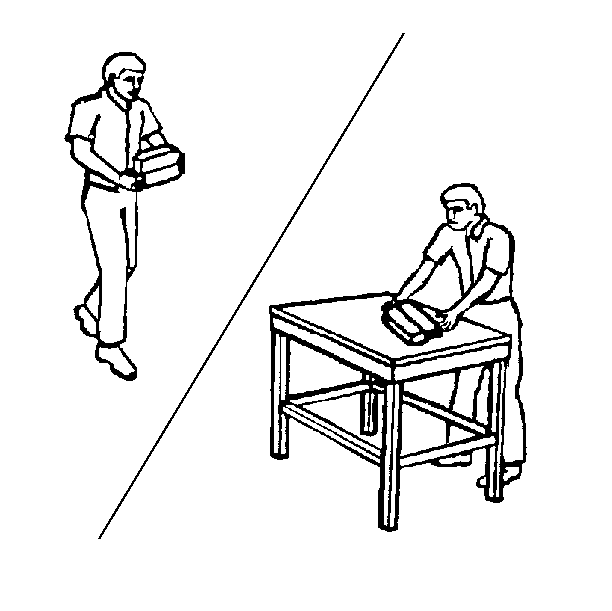
Caution: When you are carrying an undeployed inflator module:
• Do not carry the inflator module by the wires or connector on
the inflator module • Make sure the bag opening points away from you
Important: Dealers should refer to the latest General motors Service Bulletins for live (undeployed) inflatable restraint IP module scrapping and disposal procedures. All others should contact a local General Motors dealer for these procedures. Dispose of deployed IP modules through normal refuse channels.
Live (Undeployed) Inflator Module
Take special care when handling or storing a live (undeployed) inflator module. An air bag deployment produces rapid gas generation. This may cause the inflator module, or an object in front of the inflator module, to jettison through the air in the event of an unlikely deployment.
Shipping Procedures
Refer to the latest service bulletins for proper SIR inflator module shipping procedures.
Scrapping Procedure
During the course of a vehicle's useful life, certain situations may arise which will necessitate the disposal of a live (undeployed) inflator module. The following information covers the proper procedures for the disposing of a live inflator module. Deploy the inflator module before disposal. Do not dispose of the module through normal disposal channels.
Caution: In order to prevent accidental deployment of the air bag which could cause personal injury, do not dispose of an undeployed inflator module as normal shop waste. The undeployed inflator module contains substances that could cause severe illness or personal injury if the sealed container is damaged during disposal. Use the following deployment procedures to safely dispose of an undeployed inflator module. Failure to dispose of an inflator module as instructed may be a violation of federal, state, province, or local laws.
Do not deploy an air bag in the following situations:
| • | After replacement of an inflator module under warranty. The module may need to be returned undeployed to the Delphi Interior & Lighting Group. Refer to the latest service bulletin regarding SIR shipping procedures. |
| • | If the vehicle is the subject of a Product Liability report related to the SIR system and is subject to a Preliminary Investigation (GM-1241). Do not alter the SIR system in any manner. Refer to the latest service bulletin on SIR shipping procedures. |
| • | If the vehicle is involved in a campaign affecting the inflator modules. |
Deployment Procedures
The inflator module may be deployed inside or outside of the vehicle. The method used depends upon the final disposition of the vehicle. Review the following procedures in order to determine which will work best in a given situation:
Deployment Outside Vehicle (Inflatable Restraint Steering Wheel Module)
Tools Required
| • | J 38826 SIR Deployment Harness |
| • | An appropriate pigtail adapter |
Caution: In order to prevent accidental deployment of the air bag which could cause personal injury, do not dispose of an undeployed inflator module as normal shop waste. The undeployed inflator module contains substances that could cause severe illness or personal injury if the sealed container is damaged during disposal. Use the following deployment procedures to safely dispose of an undeployed inflator module. Failure to dispose of an inflator module as instructed may be a violation of federal, state, province, or local laws.
CAUTION: When you are deploying an inflator module for disposal, perform the deployment procedures in the order listed. Failure to follow the procedures in the order listed may result in personal injury.
Deploy the inflatable restraint steering wheel inflator module outside of the vehicle when the vehicle will be returned to service. Situations that require deployment outside of the vehicle include the following:
| • | Using the SIR diagnostics, you determine that the inflator module does not function properly. |
| • | The inflator module is scratched or ripped on the cover. |
| • | The inflator module pigtail (if equipped) is damaged. |
| • | The inflator module connector is damaged. |
| • | An inflator module connector terminal is damaged. |
Deployment and disposal of a malfunctioning inflator module is subject to any required retention period.
- Turn the ignition switch to the OFF position.
- Remove the ignition key.
- Put on safety glasses.
- Inspect the J 38826 and the appropriate pigtail adapter for damage. Replace as needed.
- Short the two SIR deployment harness (1) leads together using one banana plug seated into the other.
- Connect the appropriate pigtail adapter (2) to the SIR deployment harness (1).
- Remove the inflatable restraint steering wheel module. Refer to Inflatable Restraint Steering Wheel Module Replacement .
- Remove the horn lead from the back of the module, if equipped.
- Remove all horn/steering wheel control buttons from the module, if equipped.
- Place the module with the vinyl trim cover facing up and away from the surface on a work bench.
- Clear a space on the ground about 1.85 M (6 ft) in diameter for deployment of the module. If possible, use a paved, outdoor location free of activity. Otherwise, use a space free of activity on the shop floor. Make sure you have sufficient ventilation.
- Make sure no loose or flammable objects are in the area.
- Place the module in the space with the vinyl trim cover facing up.
- Extend the SIR deployment harness and adapter to full length from the module.
- Place a 12V minimum/2A minimum power source (i.e., vehicle battery) near the shorted end of the harness.
- Connect the module (1) to the adapter (2) on the SIR deployment harness (3).
- Firmly seat the adapter into the module connector.
- Clear the area of people.
- Separate the two banana plugs on the SIR deployment harness.
- Connect the SIR deployment harness wires to the power source.
- Disconnect the SIR deployment harness from the power source after the air bag deploys.
- Seat one banana plug into the other in order to short the deployment harness leads.
- If the air bag did not deploy, disconnect the adapter and discontinue the procedure. Contact the Technical Assistance Group. Otherwise, proceed to the following steps.
- Put on a pair of shop gloves.
- Disconnect the pigtail adapter from the inflator module as soon as possible.
- Inspect the pigtail adapter and the SIR deployment harness. Replace as needed.
- Dispose of the deployed module through normal refuse channels.
- Wash hands with a mild soap.
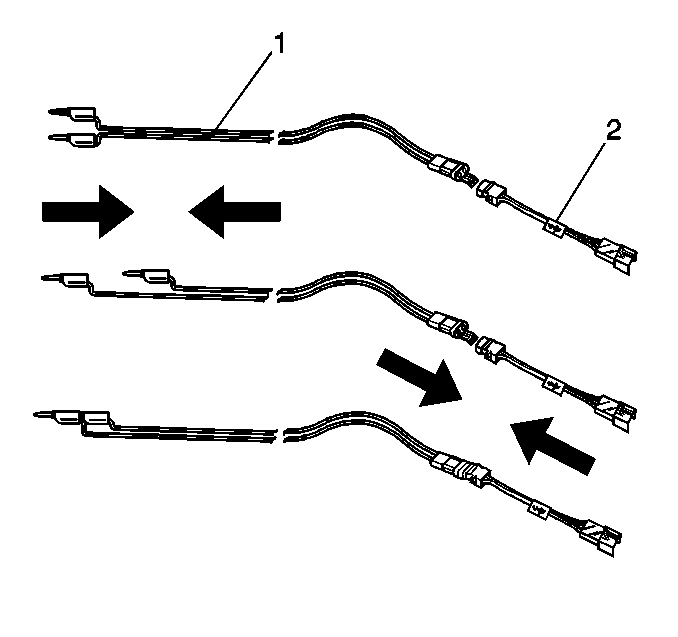
Caution: When you are carrying an undeployed inflator module:
• Do not carry the inflator module by the wires or connector on
the inflator module • Make sure the bag opening points away from you
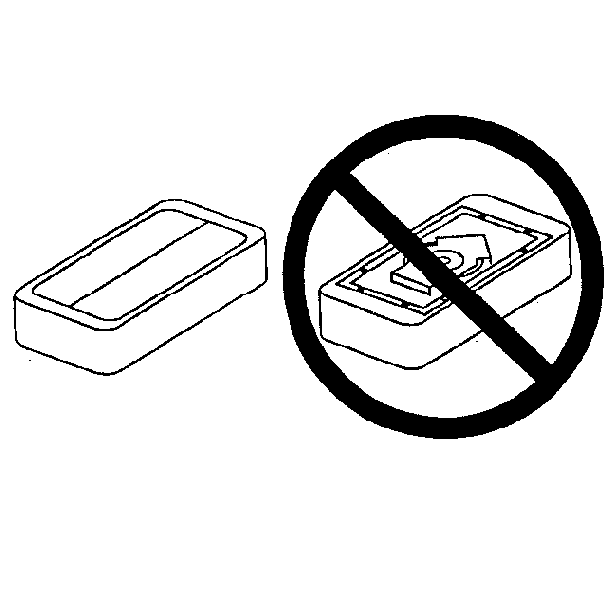
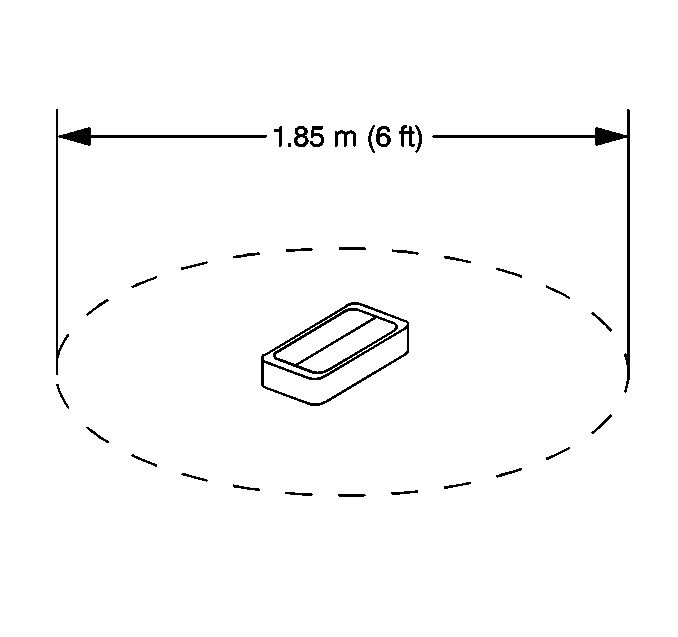
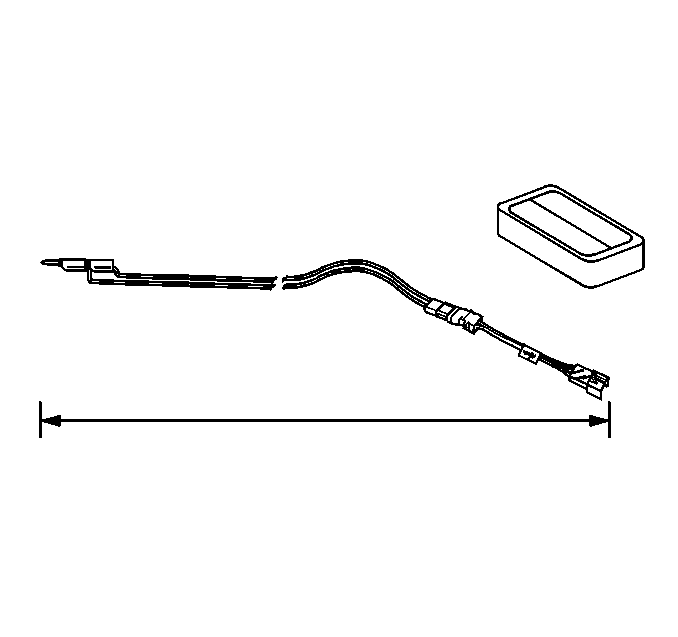
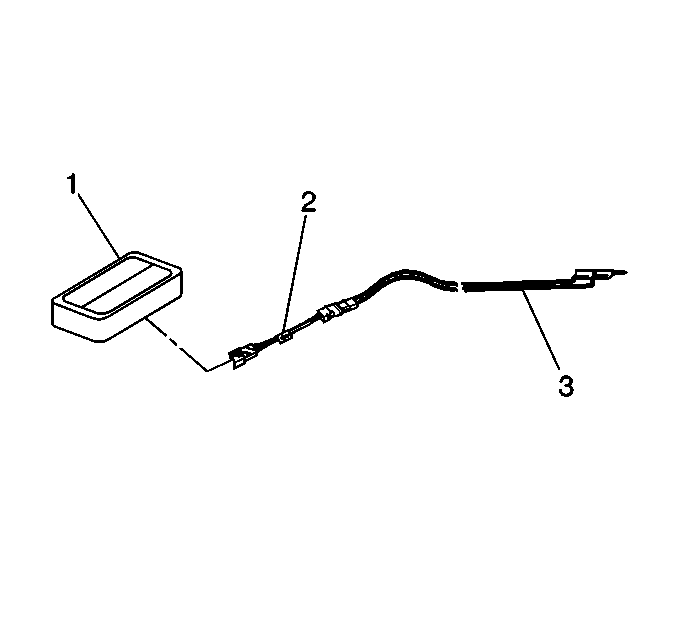
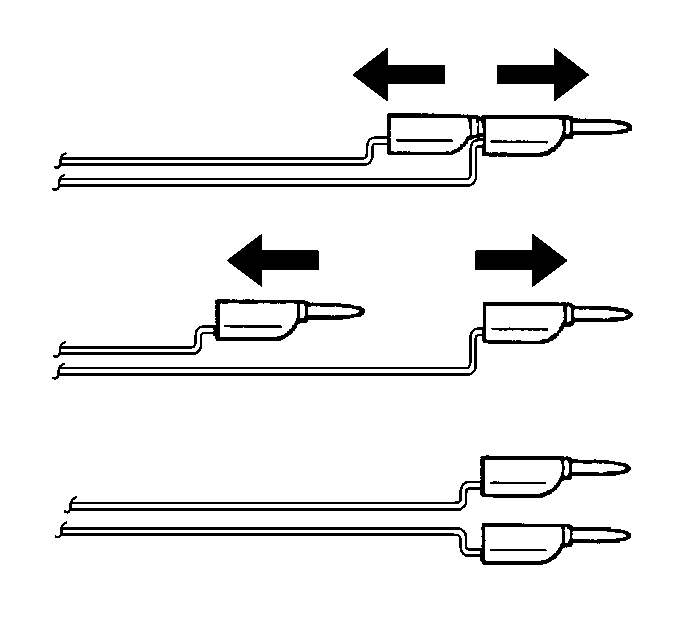
CAUTION: When you are deploying an inflator module for disposal, perform the deployment procedures in the order listed. Failure to follow the procedures in the order listed may result in personal injury.
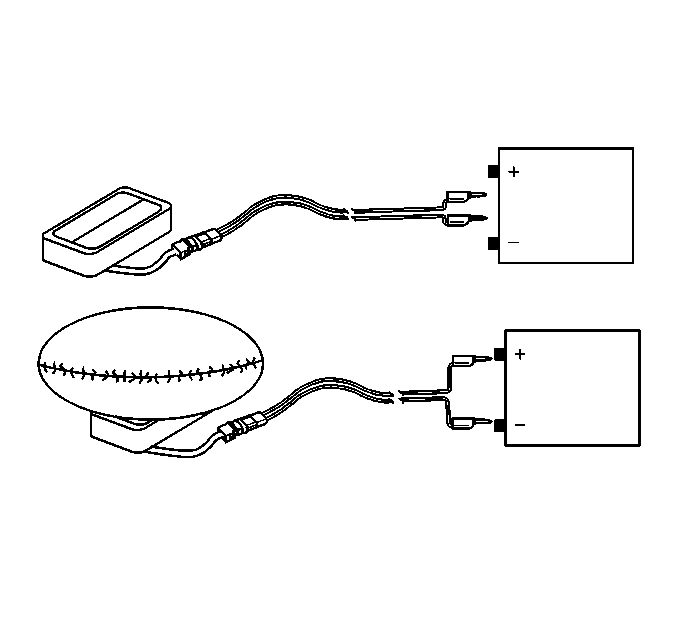
Important: The rapid gas expansion involved with deploying an air bag is very loud. Notify all the people in the immediate area that you intend to deploy the inflator module
Important: When the air bag deploys, the inflator module may jump vertically. This is a normal reaction of the inflator module to the force of the rapid gas expansion inside the air bag.
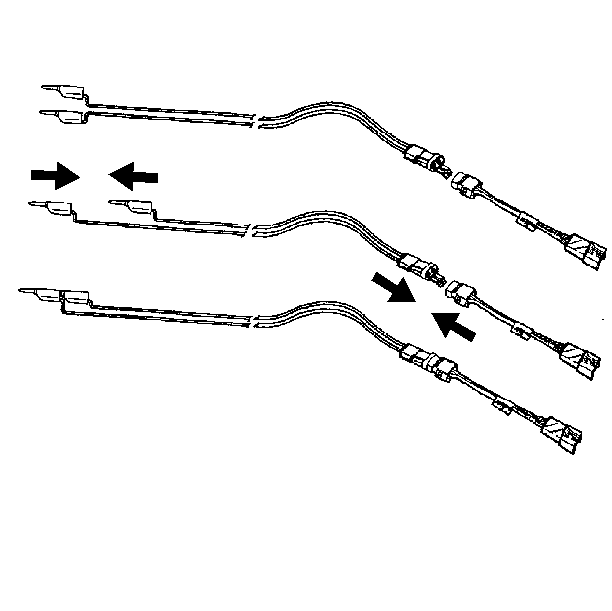
CAUTION: After an air bag deploys, the metal surfaces of the inflator module
are very hot. To help avoid a fire or personal injury:
• Allow sufficient time for cooling before touching any metal surface
of the inflator module. • Do not place the deployed inflator module near any flammable objects.
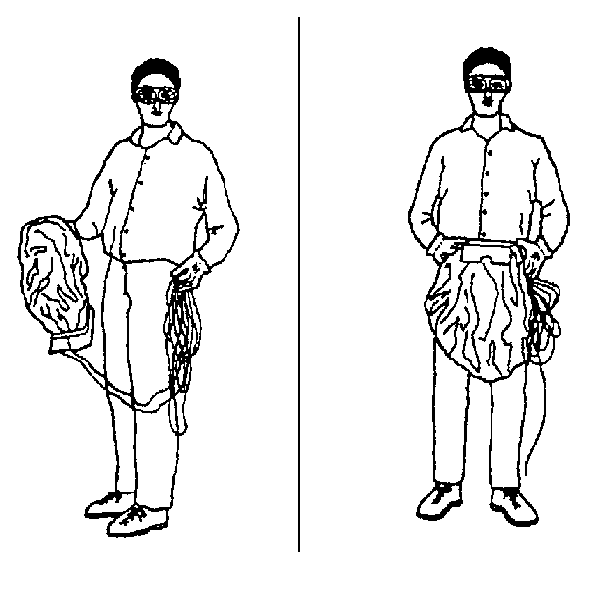
Deployment Inside Vehicle (Vehicle Scrapping Procedure)
Deploy the inflator modules inside of the vehicle when destroying the vehicle or when salvaging the vehicle for parts. This includes but is not limited to the following situations:
| • | The vehicle has completed the vehicle's useful life. |
| • | Irreparable damage occurs to the vehicle in a non-deployment type accident. |
| • | Irreparable damage occurs to the vehicle during a theft. |
| • | The vehicle is being salvaged for parts to be used on a vehicle with a different VIN as opposed to rebuilding as the same VIN. |
CAUTION: When you are deploying an inflator module for disposal, perform the deployment procedures in the order listed. Failure to follow the procedures in the order listed may result in personal injury.
- Turn the ignition switch to the OFF position.
- Remove the ignition key.
- Put on safety glasses.
- Remove all loose objects from the front seats.
- Disconnect the inflatable restraint steering wheel module yellow 2-way connector.
- Cut the yellow 2-way harness connector out of the vehicle, leaving at least 16 cm (6 in) of wire at the connector.
- Strip 13 mm (0.5 in) of insulation from each of the connector wire leads.
- Cut two 4.6 M (15 ft) deployment wires from a 0.8 mm² (18 gage) or thicker multi-strand wire. Use these wires to fabricate the driver deployment harness.
- Strip 13 mm (0.5 in) of insulation from both ends of the wires cut in the previous step.
- Twist together one end from each of the wires in order to short the wires. Deployment wires shall remain shorted, and not connected to a power source until you are ready to deploy the air bag.
- Twist together one connector wire lead to one deployment wire.
- Inspect that the previous connection is secure.
- Bend flat the twisted connection.
- Secure and insulate the connection using electrical tape.
- Twist together, bend, and tape the remaining connector wire lead to the remaining deployment wire.
- Connect the deployment harness to the inflatable restraint steering wheel module yellow 2-way connector.
- Route the deployment harness out of the vehicle's driver side.
- Disconnect the inflatable restraint IP module yellow 2-way harness connector.
- Cut the harness connector out of the vehicle, leaving at least 16 cm (6 in) of wire at the connector.
- Strip 13 mm (0.5 in) of insulation from each of the connector wire leads.
- Cut two 6.1 M (20 ft) deployment wires from a 0.8 mm² (18 gage) or thicker multi-strand wire. These wires will be used to fabricate the passenger deployment harness.
- Strip 13 mm (0.5 in) of insulation from both ends of the wires cut in the previous step.
- Twist together one end from each of the wires in order to short the wires.
- Twist together one connector wire lead to one deployment wire.
- Bend flat the twisted connection.
- Secure and insulate the connection using electrical tape.
- Twist together, bend, and tape the remaining connector wire lead to the remaining deployment wire.
- Connect the deployment harness to the inflatable restraint IP module yellow 2-way connector.
- Route the deployment harness out of the passenger side of the vehicle.
- Clear the inside and outside of the vehicle of any people or loose and flammable objects.
- Stretch the driver harness to full length.
- Stretch the passenger harness to full length.
- Completely cover the windshield and front door window openings with a drop cloth.
- Place a power source, 12 V minimum/2A minimum (i.e., a vehicle battery) near the shorted end of the harness.
- Separate the two ends of the driver deployment harness wires.
- Connect the driver deployment harness wires to the power source in order to deploy the inflatable restraint steering wheel module.
- Disconnect the driver deployment harness wires from the power source.
- Separate the two ends of the passenger deployment harness wires.
- Connect the passenger deployment harness wires to the power source in order to deploy the inflatable restraint IP module.
- Disconnect the passenger deployment harness wires from the power source.
- Twist together one end of each wire on the driver deployment harness in order to short the wires.
- Twist together one end of each wire on the passenger deployment harness in order to short the wires.
- Remove the drop cloth from the vehicle.
- Disconnect both harnesses from the vehicle.
- Discard the harnesses.
- Scrap the vehicle in the same manner as a non-SIR equipped vehicle.
- If one or both of the modules did not deploy, perform the following steps:
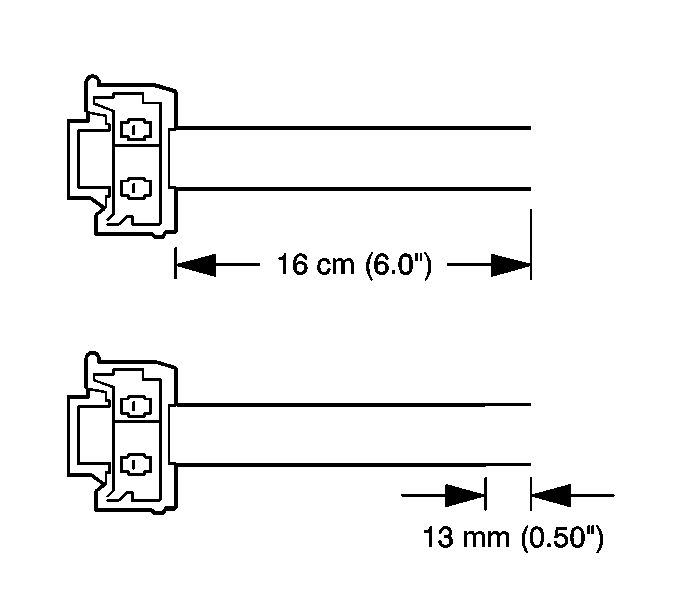
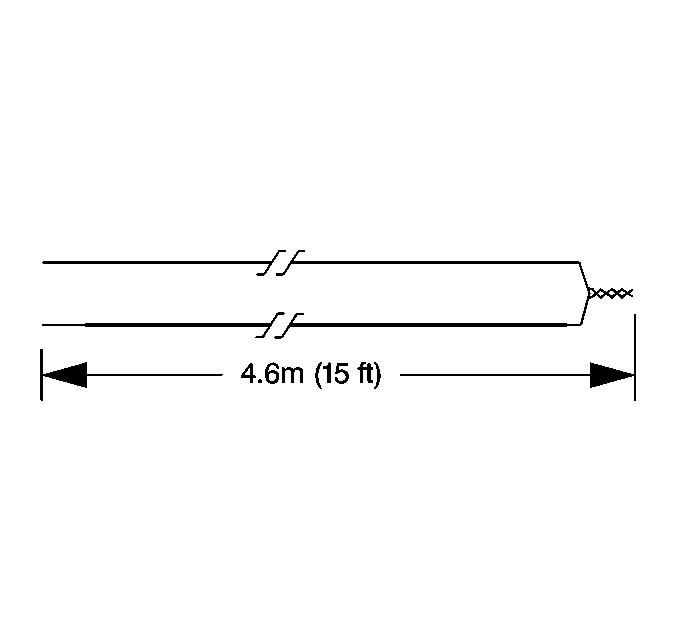
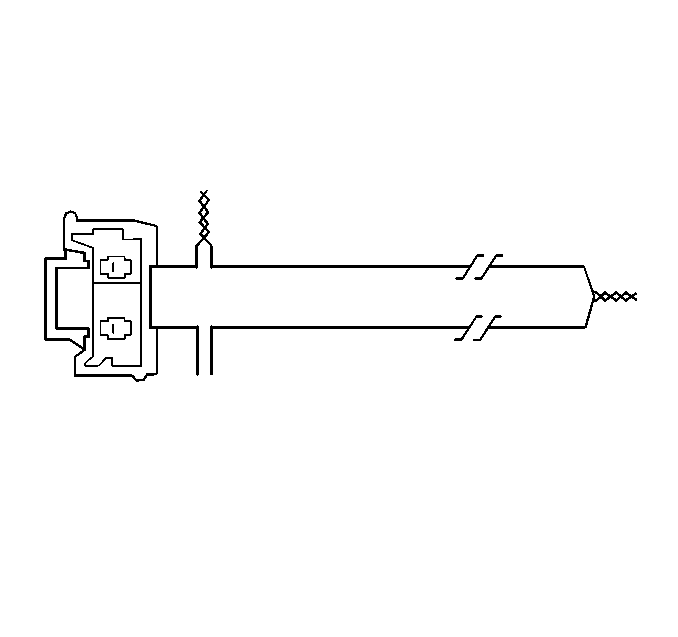
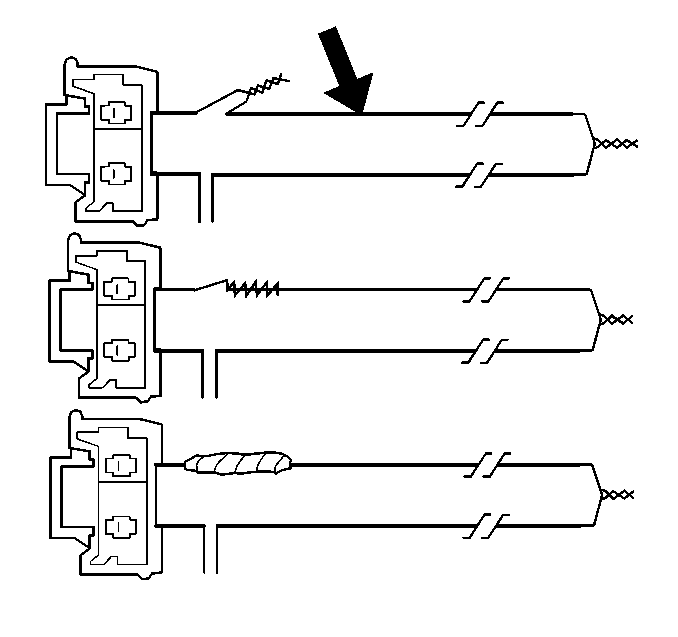
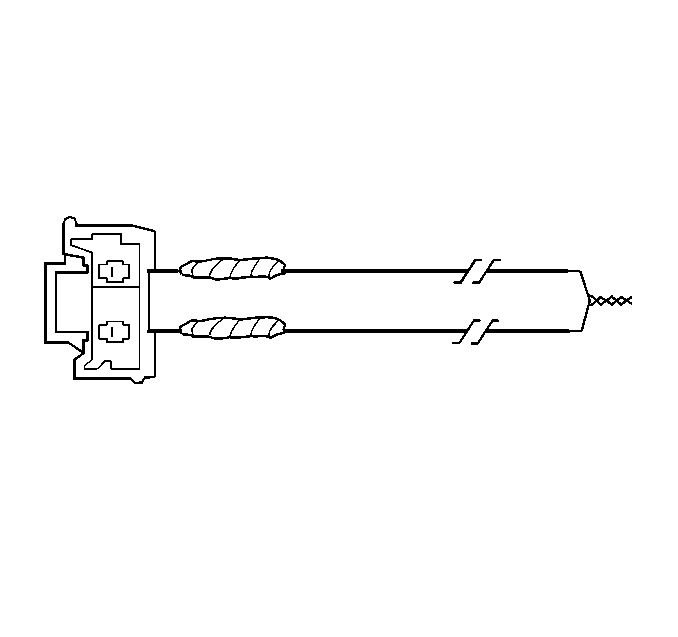
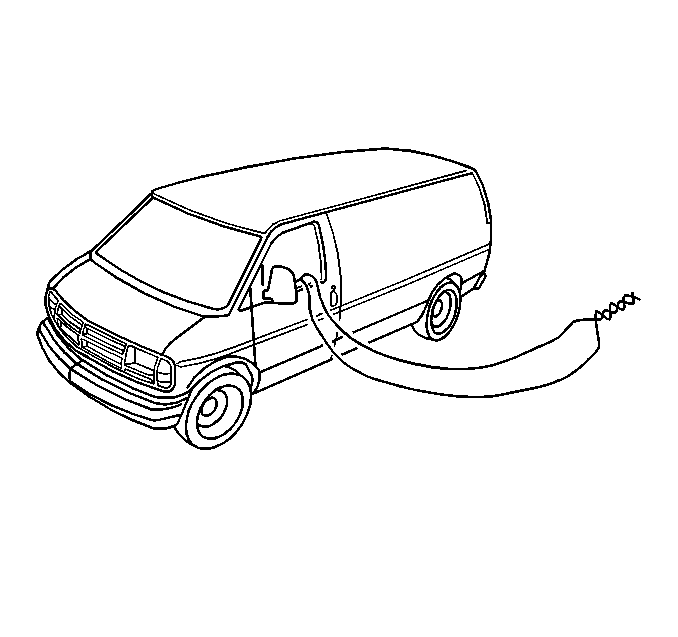
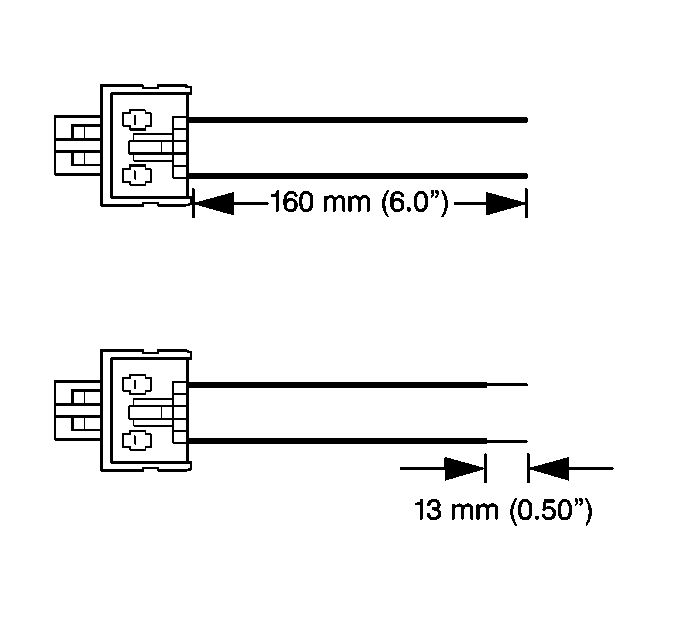
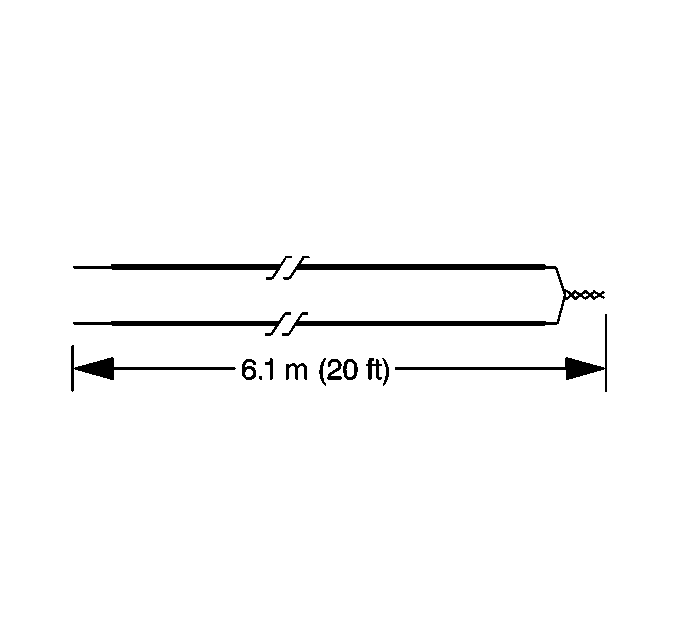
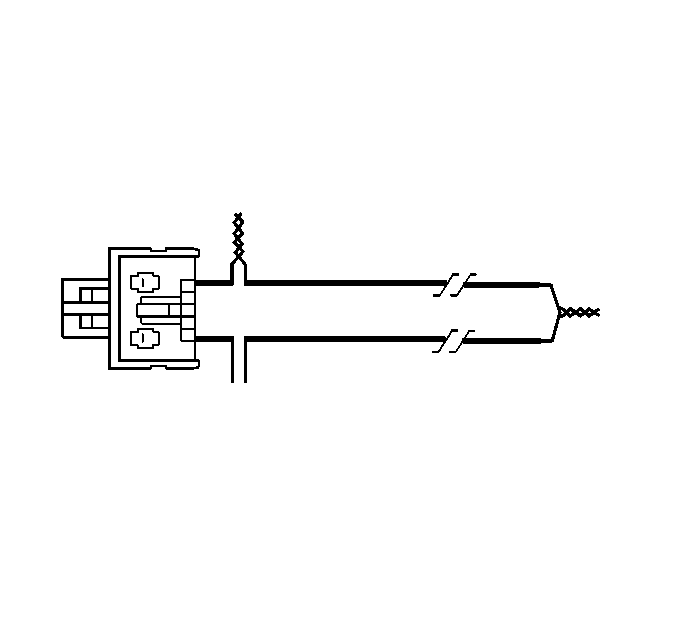
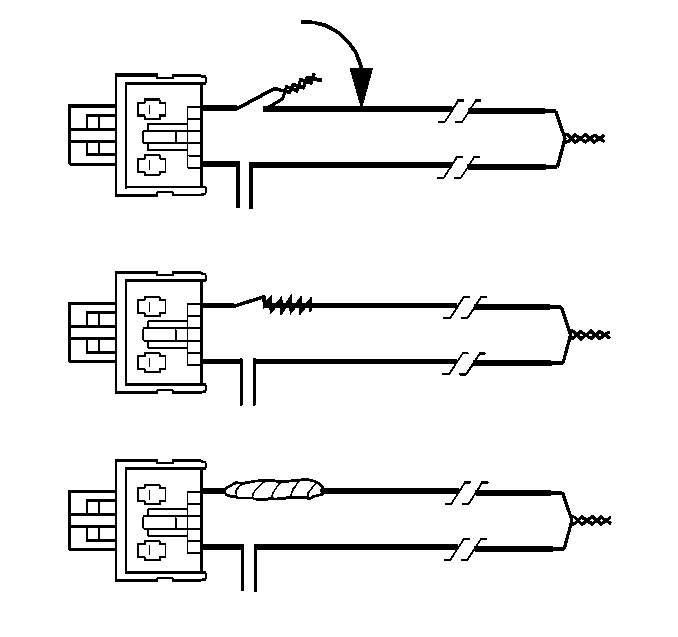
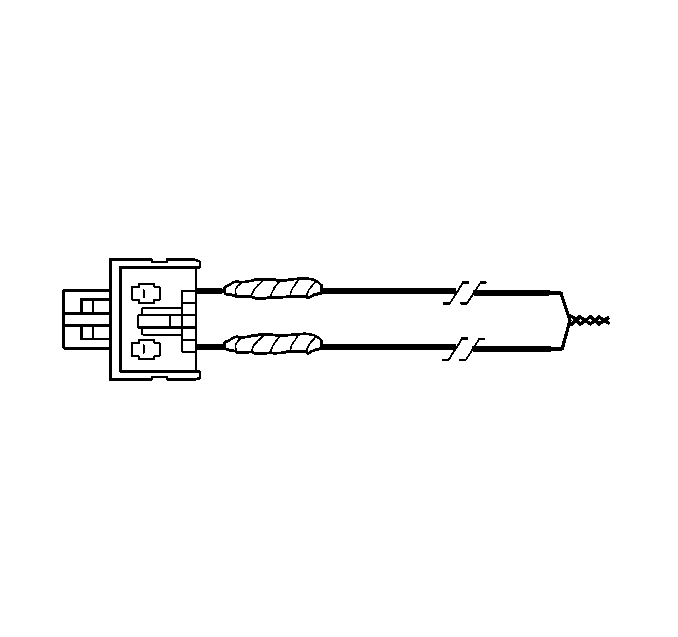
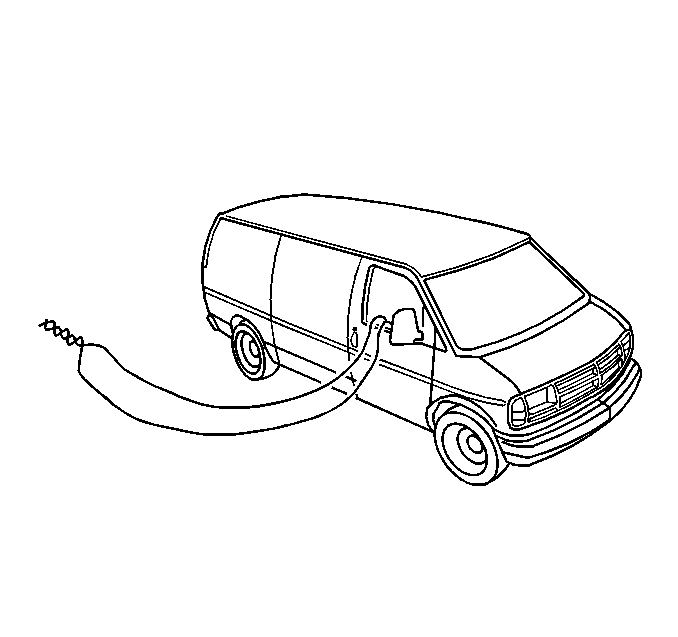
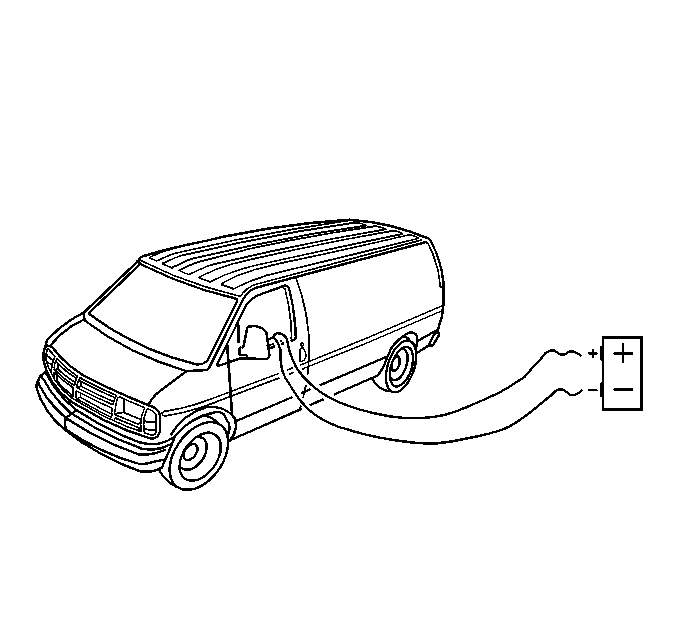
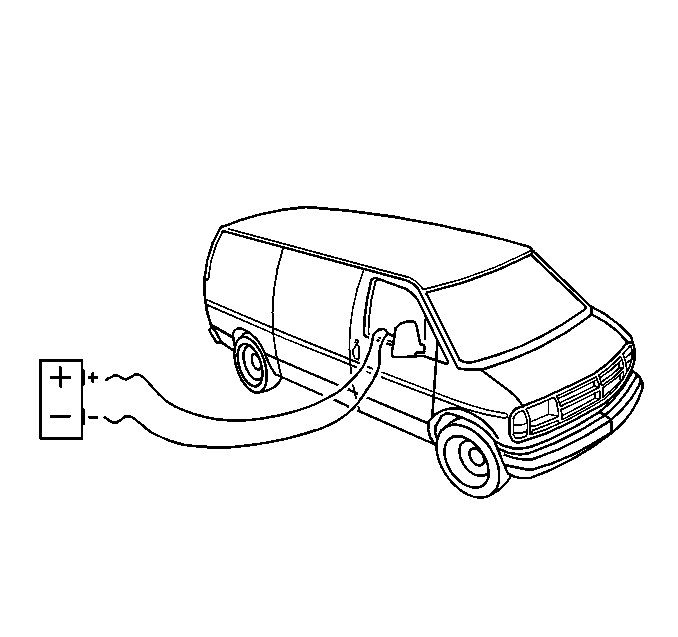


| 47.1. | Remove the undeployed module(s) from the vehicle. Refer to Inflatable Restraint Steering Wheel Module Replacement and Inflatable Restraint Instrument Panel Module Replacement . |
| 47.2. | Temporarily store the module(s). |
| 47.3. | Call the Technical Assistance Group for further assistance. |
Handling a Deployed Inflatable Restraint Steering Wheel Inflator Module
After the inflator module has deployed, the surface of the air bag may contain a powdery residue. This powder consists primarily of cornstarch (used to lubricate the bag as the bag inflates), and by-products of the chemical reaction. The deployment reaction produces sodium hydroxide dust (similar to lye soap). The sodium hydroxide quickly reacts with the atmospheric moisture. This atmospheric moisture converts the sodium hydroxide into sodium carbonate and sodium bicarbonate (baking soda). Therefore, you will probably find no sodium hydroxide present after the deployment. Gloves and safety glasses are recommended to prevent possible irritation of the skin or eyes.
